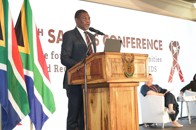
Deputy President Paul Mashatile has announced that government is concentrating on augmenting domestic funding and initiating national campaigns to address the issue of funding in the country’s fight against HIV/Aids.
This amid international donor cuts.
“Let me reiterate that as government, we acknowledge the impact of US funding cuts on our response; even so, the government is diligently working to preserve our achievements in the fight against HIV/Aids. While these accomplishments may be momentarily jeopardised, we will prevail,” the Deputy President said.
This follows the announcement by the United States President, Donald Trump’s
administration about significant cuts to foreign aid.Until recently, the United States government’s AIDS fund, the President’s Emergency Plan for AIDS Relief (PEPFAR), supported numerous nonprofits in South Africa.
These organisations assisted provincial health departments in getting people tested for HIV and ensuring they received treatment.
Speaking in his capacity as Chairperson of the South African National AIDS Council (SANAC) at the opening of the 12th SA AIDS Conference at Emperor’s Palace, in Kempton Park, Gauteng, on Monday, the Deputy President said South Africa is also exploring partnerships with BRICS nations and the private sector to cushion the impact.
BRICS is a forum for cooperation among a group of leading emerging economies, comprising Brazil, China, Egypt, Ethiopia, India, Indonesia, Iran, Russia, South Africa, and the United Arab Emirates.
Held under the theme: “Unite for Change – Empower Communities and Redefine Priorities for HIV/AIDS”, the four-day conference brings together leaders, researchers, implementing partners, academics, and advocates from South Africa, the continent, and other countries to address the evolving landscape of combating HIV and its management.
Mashatile emphasised the importance of empowering communities and shifting away from top-down, clinic-centred approach.
“To empower communities and redefine priorities for HIV/Aids, our strategies must prioritise giving power and resources to those who are most affected. This means moving away from a top-down, clinic-centred approach and towards one that is community-owned and driven.”
In redefining priorities for HIV/Aids, the Deputy President called for all stakeholders to take advantage of the National Strategic Plan for HIV, TB, and STIs (NSP 2023-2028), which calls for universal access to healthcare, greater awareness and education, and the dismantling stigma.
“We must ensure access to comprehensive and inclusive healthcare services that leave no one behind. And we must continue to champion education, awareness, and destigmatisation efforts that break down barriers and foster a culture of understanding and support.”
He also acknowledged the challenges that continue to persist in meeting the Joint United Nations Programme on HIV/AIDS (UNAIDS) 95-95-95 targets.
These targets are a global strategy for ending the AIDS epidemic by 2030, aiming for 95% of all people living with HIV to know their status; 95% of those who know their status to be on sustained antiretroviral treatment; and 95% of those on treatment to be virally suppressed.
While South Africa has made significant progress towards the targets, the Deputy President acknowledged that the country is still falling short in initiating and maintaining people on treatment.
“The country is currently sitting at 96-78-97. One of the first tasks the Minister of Health prioritised in the seventh administration is closing the gap in the second 95.”
In February this year, Health Minister Aaron Motsoaledi launched a campaign to find 1.1 million people who are infected with HIV but are not on treatment, which runs parallel to the “End TB Campaign,” with a target of testing five million people during the years 2025/26.
South Africa carries the highest burden of HIV and tuberculosis (TB) globally in relation to its population, with a higher prevalence among people aged 15 to 49.
Adolescent girls and young women aged 15 to 24 record the highest number of new infections per week compared to all other population groups.
“We are a resilient country with a brilliant track record in HIV management. Together, we can shape a future where HIV/AIDS is no longer a threat, but a distant memory of our collective strength and determination,” he added. – SAnews.gov.za
No comments:
Post a Comment